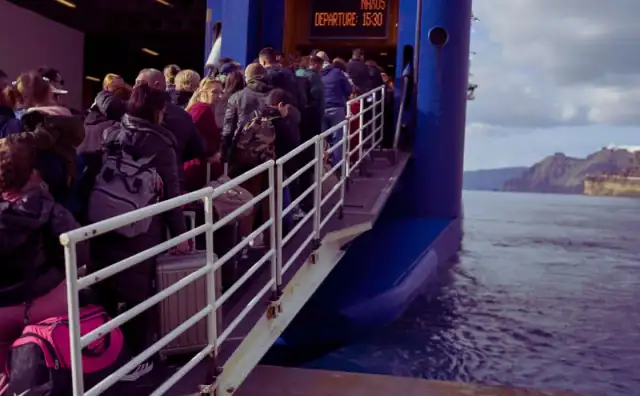
SANTORINI, GREECE – The Greek island of Santorini has been rattled by over 300 earthquakes in the past four days, sparking growing concerns among residents and experts.
Some tremors have exceeded magnitudes of 4, with stronger ones reaching up to 5 on the Richter scale. Authorities have issued safety advisories, urging people to stay outdoors and avoid small ports as seismic activity continues at an alarming pace.
Emergency response teams have been deployed to the island, and transportation services have been overwhelmed as thousands seek to leave.
Ferries are transporting residents to Athens, while airlines have scheduled additional flights to accommodate the surge in demand.
However, ticket prices have skyrocketed, making evacuation difficult for some. Local authorities have set up tent camps as a precaution in case a stronger earthquake strikes.
Volcanic Concerns Rise
The earthquakes have reignited fears that the dormant Santorini volcano could be reawakening.
While Greek seismologists have not confirmed a direct link between the tremors and volcanic activity, some experts believe magma intrusion into the Earth’s crust could be a possible cause.
Prof. Dimcho Solakov from the Bulgarian Academy of Sciences emphasized that the region is highly seismically active due to the interaction between the Eurasian and African tectonic plates.
He warned that the current earthquake swarm could last for weeks, but predicting a major seismic event remains impossible. Authorities have intensified monitoring efforts, closely observing water movements for any signs of volcanic activity.
Residents have described the tremors as unsettling, occurring at intervals of 10 to 20 minutes. Many recall the devastating 1956 earthquake, which followed a similar pattern of swarms before culminating in a powerful 7.6-magnitude quake.
Government Response and Public Reaction
The Greek government has mobilized special forces, rescue teams, and drones to assess the situation, alongside emergency supply deliveries.
Prime Minister Kyriakos Mitsotakis has urged the public to remain calm, but anxiety is spreading among residents, particularly those with memories of past seismic disasters.
Schools on the island have been closed for the remainder of the week, and residents have been receiving emergency alerts on their phones before stronger quakes hit.
Some Bulgarian residents on the island have called on the Bulgarian government for assistance, citing the soaring cost of travel as a barrier to evacuation.
Many have expressed concerns over their safety, but with ticket prices at a premium and transport options limited, they feel trapped on the island.
Uncertain Future
While no official evacuation order has been issued, many are leaving voluntarily. Ferries and flights are operating at full capacity, with authorities arranging additional transport options to accommodate demand.
Seismologists continue to study the earthquake swarm, but with no clear indications of when the tremors will subside or escalate, uncertainty looms over Santorini. Residents and tourists remain on edge, fearing that the next major quake could be imminent.
